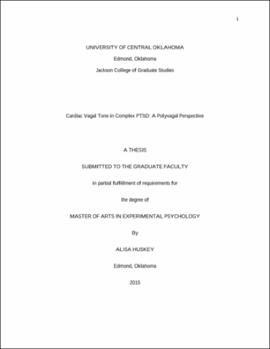| dc.contributor.advisor | Lack, Caleb | |
| dc.contributor.author | Huskey, Alisa | |
| dc.date.accessioned | 2020-07-13T19:06:37Z | |
| dc.date.available | 2020-07-13T19:06:37Z | |
| dc.date.issued | 2015 | |
| dc.identifier.other | (AlmaMMSId)9982440175502196 | |
| dc.identifier.uri | https://hdl.handle.net/11244/325245 | |
| dc.description.abstract | Differences in functionality, impairment, and symptoms provide support for a nosological distinction between Complex PTSD and PTSD. Based on this information, the next step is to examine biological characteristics between the populations, thus bolstering the evidence supporting the uniqueness of these symptom expressions and associated etiologies. The proposed study is the first of its kind to do this, by examining theoretically derived potential differences between these populations. This investigation proposes the polyvagal theory as a comprehensive model through which one can examine psychological and physiological differences to demonstrate a systemic perspective of Complex PTSD. The primary distinguishing characteristic of Complex PTSD is the global symptom expression, disrupting multiple domains of functionality - relationships, emotions, and self-perception. From a polyvagal perspective, interpersonal problems and affect dysregulation are described by the same affective system -faulty neuroception, causing dysregulation in the hierarchical behavioral strategies. Physiologically, this dysregulation removes the neural inhibitory mechanism (cardiac vagal tone or vagal brake), while promoting one of the primal defensive strategies as autonomic regulator. Observations of the cardiopulmonary oscillator was expected to reveal differences between Complex PTSD, PTSD, and control samples. Hypotheses were confirmed, indicating that vagal brake does not reengage in the post-task resting period in the clinical groups, Complex PTSD and PTSD. Moreover, average RSA is lowest in the Complex PTSD group, as anticipated, given the severe affect dysregulation and social dysfunction evident in the symptomology. | |
| dc.rights | All rights reserved by the author, who has granted UCO Chambers Library the non-exclusive right to share this material in its online repositories. Contact UCO Chambers Library's Digital Initiatives Working Group at diwg@uco.edu for the permission policy on the use, reproduction or distribution of this material. | |
| dc.subject.lcsh | Vagus nerve | |
| dc.subject.lcsh | Post-traumatic stress disorder | |
| dc.title | Cardiac vagal tone in complex PTSD : a polyvagal perspective. | |
| dc.type | Academic theses | |
| dc.contributor.committeeMember | Jeyaraj-Powell, Tephillah | |
| dc.contributor.committeeMember | Burr, Brandon | |
| dc.thesis.degree | M.A., Experimental Psychology | |
| dc.subject.keywords | Affect Dysregulation | |
| dc.subject.keywords | Cardiac Vagal Tone | |
| dc.subject.keywords | Complex PTSD | |
| dc.subject.keywords | Neuroception | |
| dc.subject.keywords | Polyvagal | |
| dc.subject.keywords | Respiratory Sinus Arrhythmia | |
| dc.identifier.oclc | (OCoLC)ocn947119002 | |
| uco.group | UCO - Graduate Works and Theses::UCO - Theses | |
| thesis.degree.grantor | Jackson College of Graduate Studies | |
